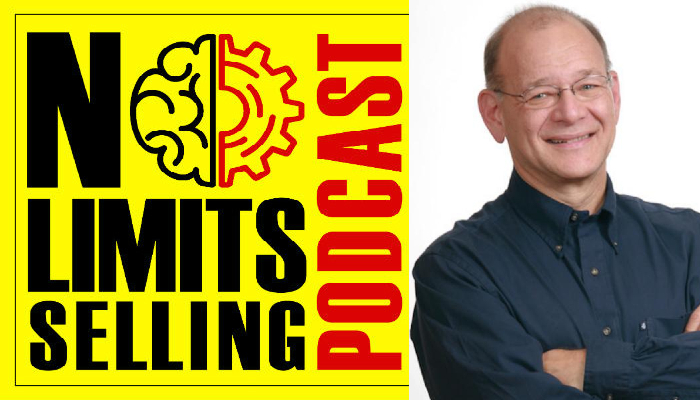Why Adaptability For Leadership Is A Critical Skill
On Episode 216 of The No Limits Selling Podcast, we have Ira Wolfe, a Top 5 Global Thought Leader Future of Work and HR | Workplace Futurist / Recruitment Marketing Strategist / Employee Selection Expert / Author / TEDx Speaker / Virtual Keynote Speaker/ Podcaster. In this episode, Ira talks about why adaptability for leadership is important.
Ira S Wolfe is a “Millennial trapped in a Baby Boomer body” and the world’s first Chief Googlization Officer. He is the president of Poised for the Future Company (DBA Success Performance Solutions.)
Fueled by his fierce passion for technology and its impact on people, Ira S. Wolfe has emerged as one of HR’s most visionary thinkers and influencers on the future of work, jobs, and talent acquisition. Thinkers360 has recognized Ira as the #1 Thought Leader on the Future of Work and #3 on Human Resources.
Ira is an accomplished speaker/author. He has presented on the prestigious red carpet of TEDx and stages of DisruptHR. Ira is a frequent presenter at events including SHRM’s Talent and Annual Conference, HR Southwest, and many regional and state events. He is the author of several books including his most recent, the 2nd edition of Recruiting in the Age of Googlization, which was selected by Book Authority as one of the all-time best HR and Recruiting books.
Ira is the host of the popular weekly Geeks Geezers and Googlization Show, a contributor to CornerstoneOnDemand’s ReWork, and a frequent expert guest on podcasts, TV, and radio.

Contact Ira:
[EDITOR’S NOTE: This podcast is sponsored by No Limits Selling. It is a fun, fast-paced podcast that delivers hard-fought business advice that you can implement today to improve your sales and performance]
Interested In Our Real Estate Coaching Services? Explore Our Website: Link
Feeling Not Well Today? You Can Use Our Mindset Boosters App To amp Up Your Mood: Link
Find us on Social Media:
LinkedIn | Facebook community | Instagram
Like what do you listen to? Subscribe to our podcast!
Ready to become fearless? We can help you become fearless in 60 days so you accomplish more in your career Schedule A 15 min Call with Umar
Summary
Introduction and Background of Ira Wolfe
The podcast begins with Umar Hameed introducing Ira Wolfe, a renowned expert in workforce trends and recruitment. Ira is also the author of the book "Recruiting in the Age of Googlization", which explores the impact of technology and changing societal trends on recruitment practices.
The Importance of Adaptability for Leadership
Ira emphasizes the crucial role of adaptability for leadership in the modern workforce. He argues that the rapid pace of change in today's world necessitates not only learning new skills but also unlearning obsolete ones and relearning updated ones. This continuous cycle of learning, unlearning, and relearning is what keeps individuals and organizations relevant and competitive.
Understanding Googlization
The conversation then shifts to the concept of "Googlization". Ira explains that this term refers to the profound influence Google has had on our thought processes and behaviors, particularly our expectation for instant gratification. This shift in expectations has significant implications for businesses and recruitment, as potential employees and customers alike demand immediate responses and results.
Adaptability Quotient (AQ)
Ira introduces the concept of the "Adaptability Quotient" (AQ), which he argues is more important than traditional measures of intelligence (IQ) and emotional intelligence (EQ) in the current era. AQ measures how well a person or an organization can adapt to change, a skill that is becoming increasingly valuable as the pace of change accelerates, which directly influences adaptability for leadership in any organization.
Challenges in Recruitment
The podcast also delves into the challenges faced in recruitment. Ira notes that many companies are still adhering to outdated recruitment practices and failing to adapt to new methodologies. He advocates for a more modern approach to recruitment that leverages technology and data to find the best candidates.
Employee Engagement
The topic of employee engagement is also discussed, with Ira arguing that engagement is not just about employee happiness. Instead, it's about aligning the goals of the employees with those of the organization. When employees feel that their work contributes to the larger objectives of the company, they are more likely to be engaged and productive.
Conclusion
In this insightful podcast, Umar Hameed and Ira Wolfe explore the evolving landscape of the modern workforce and recruitment. They delve into the concept of "Googlization" and its impact on societal expectations for instant gratification, which has significant implications for businesses and recruitment. Ira emphasizes the importance of adaptability in leadership and introduces the concept of the "Adaptability Quotient" (AQ), arguing it's more crucial than traditional intelligence measures in today's rapidly changing world.
They discuss the challenges in recruitment, with many companies still adhering to outdated practices, and the need for a more modern, data-driven approach. The conversation also covers employee engagement, stressing that it's not just about happiness, but aligning employee goals with those of the organization. The podcast concludes with a strong endorsement for continuous learning as a vital tool for individuals and organizations to stay relevant and competitive in an ever-changing environment.
Questions & Answers
What is the concept of "Googlization" as discussed in the podcast with Ira Wolfe?
How does Ira Wolfe define the "Adaptability Quotient" (AQ)?
What are the modern challenges in recruitment according to Ira Wolfe?
How does Ira Wolfe view employee engagement?
Why is continuous learning important according to the podcast with Ira Wolfe?
Who is Ira Wolfe and what is his book about?
Don’t miss this opportunity to transform your real estate career with one-on-one coaching. As an experienced real estate coach, I, Umar Hameed, am dedicated to helping you unlock your full potential and achieve your real estate goals. To learn more about who am I and my clients ↓
If you’re ready to take the next step, book an appointment with me today and begin your journey toward success in the real estate industry.
